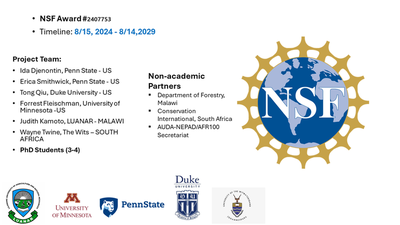New NSF grant funded to study ecological restoration in forest-grassland ecosystems
This research investigates how and why restoration programs impact social and environmental systems in forest-grassland ecosystems. While restoration is purported to address interlinked crises of environmental degradation, biodiversity loss, and climate change, little is known about what restoration programs achieve as outcomes and what tradeoffs exist between global and local sustainability goals and needs. The research hypotheses that effective restoration involves significant tradeoffs between ecological and social goals and is the result of the interplay of other forces, including participatory governance, land rights, and technical capacity. The research employs multiple methods, including remote sensing, field-based ecological measurements of biodiversity and carbon storage, household surveys, interviews, and focus group discussions to address globally important critical knowledge gaps in restoration science. By generating empirical evidence and insights about restoration governance processes and outcomes, the research contributes to advance understanding and application of restoration as a nature-based solution.

The Qiu lab at Duke will be in charge of field sampling in Malawi and South Africa and then synthesized data with remote sensing to evaluate the ecological consequences from restoration in those two regions.